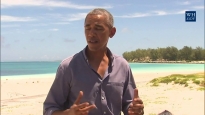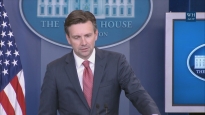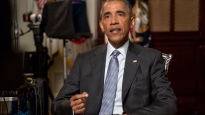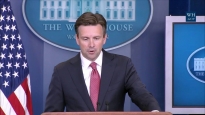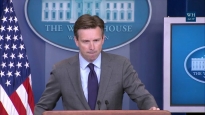Senior Administration Officials Hold a Briefing on the U.S. Government's Ebola Response
October 03, 2014 | 44:01 | Public Domain
At the White House, senior administration officials hold a briefing on the U.S. government's response to the Ebola epidemic, October 3, 2014.
Senior Officials Hold a Briefing on the U.S. Government Response to Ebola
This afternoon at the White House, senior administration officials held a briefing on the U.S. government response to the Ebola epidemic.
Lisa Monaco, Assistant to the President for Homeland Security and Counterterrorism, started off the briefing by reiterating the President's message that "we are not facing just a health crisis -- we are facing a national security priority."
Monaco added that since the start of the outbreak in March, President Obama has directed the U.S. government to scale up the response at home and in affected countries in West Africa. "And that's exactly what we've done," she said, by deploying U.S. military members to the affected countries, to support civilian efforts in the region.
The U.S. strategy to combat the Ebola outbreak, Monaco said, consists of four key goals:
- To control the epidemic at its source in West Africa.
- To mitigate the second-order impacts of this epidemic.
- To lead a coordinated international response.
- To build a robust global health security infrastructure so we're prepared over the long run to confront epidemics such as the Ebola epidemic.
As she noted, we're using a "whole-of-government approach and response to control this epidemic at its source" -- evidenced by the other officials accompanying her at today's briefing:
- Sylvia M. Burwell, Secretary of Health and Human Services
- Dr. Anthony Fauci, Director of the National Institute of Allergy and Infectious Diseases
- Dr. Rajiv Shah, Administrator of the U.S. Agency for International Development (USAID)
- Gen. David Rodriguez, commander of U.S. Africa Command (USAFRICOM)
"I think it's very important to remind the American people," she said, "that the United States has the most capable health care infrastructure and the best doctors in the world, bar none."
Monaco reiterated that the U.S. is prepared to deal with the epidemic, both at home and in the region of West Africa -- noting that every Ebola outbreak in the past 40 years has been stopped. "We know how to do this, and we will do it again," she said.
Later in the briefing, Dr. Fauci provided additional facts about Ebola and its transmission.
"Specifically, the Ebola virus is not easily spread like a cold or influenza. You must come into direct contact with the bodily fluids of a sick person, or through exposure to objects that have been contaminated with infected body fluids."
-- Dr. Anthony Fauci
Dr. Fauci added that Ebola is not a respiratory disease, meaning that it can't be spread through the air -- and reiterated that individuals that are not showing symptoms are not contagious.
Learn more:
- Get more information from the CDC on Ebola virus disease on topics including: transmission, diagnosis, signs and symptoms, treatment, risk of exposure, and prevention
- Stay up-to-date on the current Ebola outbreak by following @CDCemergency on Twitter
- Get a readout of the President’s call with CDC Director Dr. Tom Frieden
|
September 1, 2016
|
September 1, 2016
|
August 31, 2016
|
August 30, 2016
|
|
August 29, 2016
|
August 27, 2016
|
August 26, 2016
|
August 25, 2016
|
- &lsaquo previous
- …
- 26
- 27
- 28
- 29
- 30
- 31
- 32
- 33
- 34
- …
- next &rsaquo
